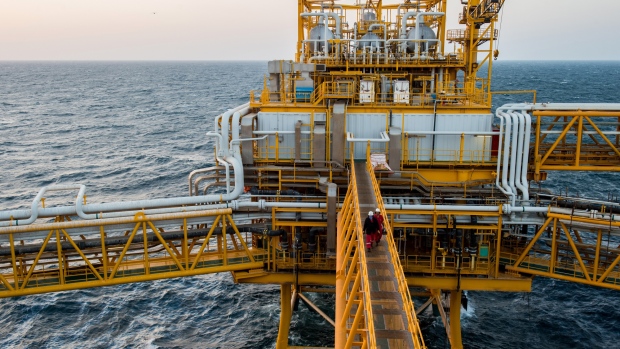Apr 23, 2019
Oil sets new high for 2019 as 'non-committal' Saudis sow doubt
, Bloomberg News

Oil climbed to the highest settlement price in almost six months as Saudi Arabia was said to be tentative about raising output to mute the impacts of American sanctions against Iran, one of OPEC’s largest producers.
Brent crude futures climbed 0.6 per cent on Tuesday, a day after the U.S. pledged to drive Iranian oil exports to “zero.” The Saudis are holding off on any significant supply shifts until they see actual declines in Iranian output, according to people familiar with policy deliberations in Riyadh.
U.S. oil also surged but gave up some of the gain in after-hours trading following an industry report said to show growing U.S. crude inventories.
Oil surged on Monday after the U.S. said it wouldn’t extend waivers that had allowed China, India and six other countries to continue buying 1.4 million barrels a day from Iran. While Saudi Arabia pledged to help keep global markets adequately supplied, the cutoff would come as OPEC production cuts and unrest in Venezuela and Libya are already tightening supplies.
“It’s been made clear that Trump is very serious about enforcement of the sanctions,” said Tyler Richey, co-editor at Sevens Report Research in Palm Beach Gardens, Florida. “The question is how much will their exports fall versus how much and how quickly can Saudi Arabia and other producers increase?”
A senior Iranian military official said the Islamic Republic is prepared to shut the Strait of Hormuz, the critical Persian Gulf chokepoint, according to the state-run Fars news agency.
American pressure on Iran’s exports won’t work, Iranian Oil Minister Bijan Namdar Zanganeh told his parliament. “We will act wholeheartedly to break the U.S. sanctions,” he said.
Brent for June settlement rose 47 cents to US$74.51 a barrel at the close of trading on London’s ICE Futures Europe exchange. The contract was at a premium of US$8.22 to U.S. West Texas Intermediate.
WTI for June delivery gained 75 cents to close at US$66.30 on the New York Mercantile Exchange, reaching the highest close since late October.
The benchmark U.S. contract retreated to US$66.17 at 4:49 p.m. in New York, after the industry-funded American Petroleum Institute was said to find crude stockpiles rose by 6.9 million barrels last week. That would be far above the 1 million barrel increase forecast in a Bloomberg survey, if confirmed by official government figures on Wednesday.
Although the Trump administration had already stated its desire to impede Iranian exports, the halt was more sudden than anticipated, Goldman Sachs Group Inc. said. Iran’s shipments could be slashed by as much as 60 per cent to 500,000 barrels a day, said Helima Croft, chief commodities strategist at RBC Capital Markets LLC in New York.
The Saudis and the U.A.E. can boost their combined output by about 1.5 million barrels a day within a short period, according to other people familiar with the matter.
Nonetheless, “the Saudi response was extremely non-committal,” Amrita Sen, chief oil analyst at consultant Energy Aspects Ltd., said in a Bloomberg Television interview. The kingdom will move cautiously, having bolstered production last year when the U.S. similarly pledged to halt Iranian flows, only to backpedal at the last minute, she said.
Other oil-market news: Gasoline futures rose 0.1 per cent to US$2.1316 a gallon. Murphy Oil Corp. agreed to acquire more deepwater Gulf of Mexico assets for about US$1.38 billion as the U.S. company continues to refocus on production closer to home. Nigeria’s Bonny crude pipeline was sabotaged by fire over the weekend, operator Aiteo said.



